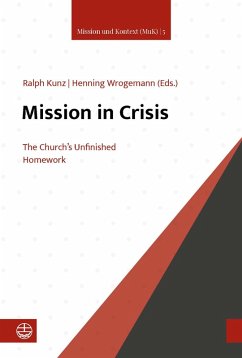»Mission in crisis« - this diagnosis makes immediate sense in view of the rapid decline of European Christian churches. However, there is a great deal of controversy as to what exactly this crisis consists of, what its actual causes are and what dynamics the crisis discourse itself exhibits. The contributions in this volume were held on an international conference that took place from November 25-27, 2022 at the University of Zurich. They pursue these questions from a mission-theological perspective and seek to open up new perspectives for the future of the church in both secular and plural societies. With contributions from: Heike Breitenstein, John G. Flett, Ralph Kunz, Sabrina Müller, Stefan Paas, Henk de Roest, Stefan Schweyer, Patrick Todjeras, Graham Tomlin, Benno van den Toren, and Henning Wrogemann. [Mission in der Krise. Über eine unerledigte Aufgabe der Kirche] »Mission in der Krise« - diese Diagnose leuchtet im Blick den rapiden Niedergang europäischer christlicher Kirchen unmittelbar ein. Allerdings ist heftig umstritten, worin genau diese Krise besteht, was ihre eigentlichen Ursachen sind und welche Dynamik der Krisendiskurs selbst aufweist. Die Beiträge des vorliegenden Bandes stammen von einer internationalen, vom 25.-27.11.2022 an der Universität Zürich abgehaltenen Tagung. Sie gehen diesen Fragen in missionstheologischer Perspektive nach und suchen neue Perspektiven für die Zukunft von Kirche in ebenso säkularen wie pluralen Gesellschaften zu eröffnen.
Dieser Download kann aus rechtlichen Gründen nur mit Rechnungsadresse in A, B, BG, CY, CZ, D, DK, EW, E, FIN, F, GR, H, IRL, I, LT, L, LR, M, NL, PL, P, R, S, SLO, SK ausgeliefert werden.









